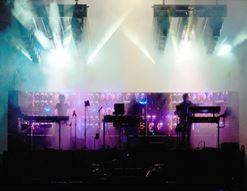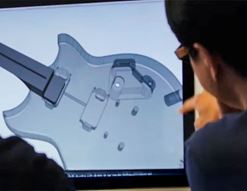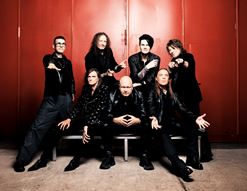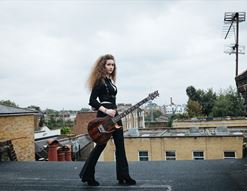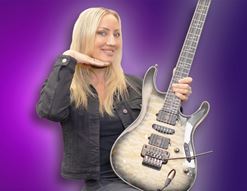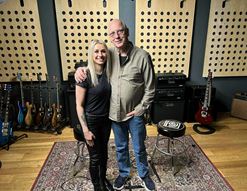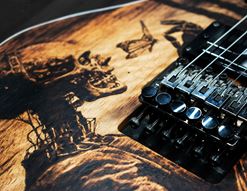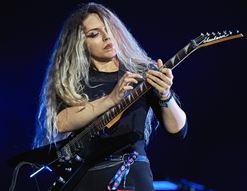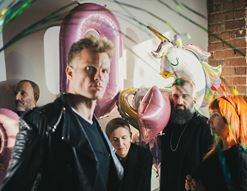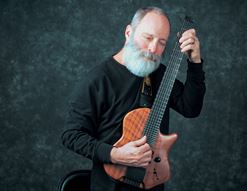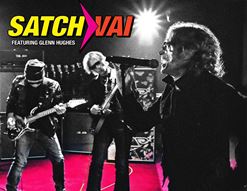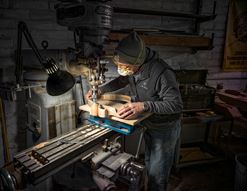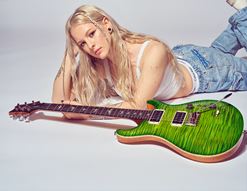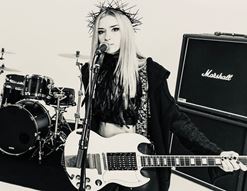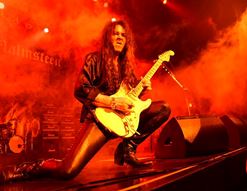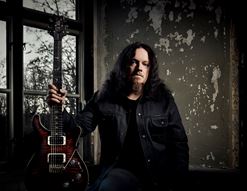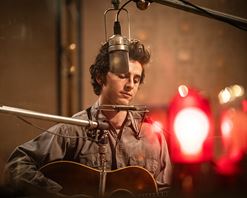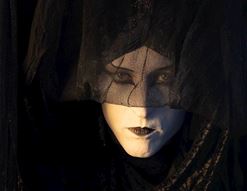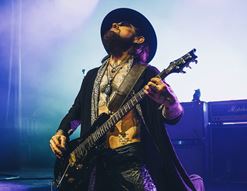It's a bright morning in the UK as I throw back my strong morning coffee, but it's a pitch-black evening Down Under, according to my computer screen. Hayley Mary is talking to me from Sydney, Australia, as the Covid pandemic continues to tear around the world. The singer-songwriter, well-known as lead vocalist in epic indie band The Jezabels, actually lives in Melbourne, but, as we learn during our hour-long Skype chat, Australia’s lockdown measures are keeping her from home.
We laugh about it, but it’s dicey stuff: no one in recent memory has ever had to live through these unusual and potentially dangerous times, far less strike out on a newly forged solo career! However, that is just what Hayley has done, moving forwards as well as possible, amidst a sea of restrictions and last-minute plan changes. Talk about uncertain times?
Late last year, Hayley released her debut solo EP, The Piss, The Perfume, which contains 5 energetic tracks of melodic rock that are – surprisingly- quite different to what most Jezabels fans were expecting! There’s a little more snarl and sass to accompany the soaring, and there’s a light-heartedness that sits in relative opposition to the earnest sweep of the Jezabels’ emotional and dramatic music. Surprising, then, but in a most welcome way. This is a side of Hayley we haven't necessarily seen before and it suits her.
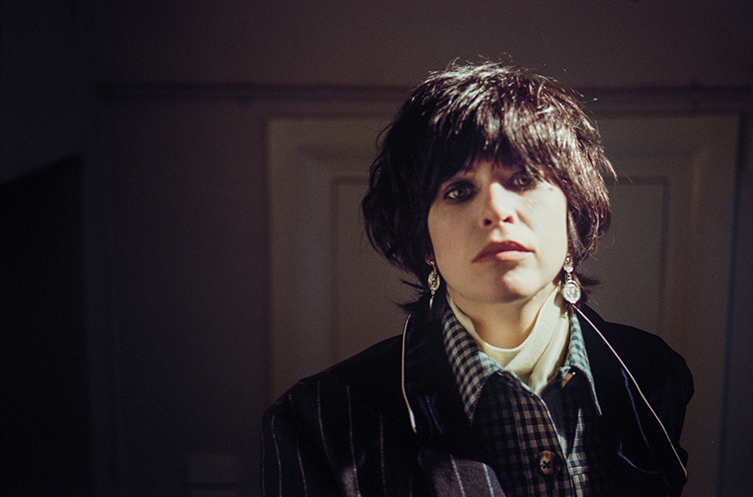
We (and no doubt she) expected her to build upon this beginning with a busy 2020, until You Know What swept across the planet. Unlike some other artists, though, Hayley hasn’t let it stop her in her tracks. You’ll read about the difficulties, but she is actively performing - when safe circumstances permit - and also releasing music throughout this period, deciding wisely that her fans probably need new music from her now more than ever.
When we speak, she is taking a short break from some socially-distanced studio time and is staying at a friends’ apartment, moving from room to room as our dodgy internet connection fluctuates. All through the conversation, she’s charming and funny, with her characteristic honesty never far from the surface. What’s best is her positive attitude in the face of such difficult times for all artists. She’s under no illusions, but she’s choosing to see the possibilities in today’s cultural landscape, instead of retreating in despair. That alone, is worthy of respect and admiration.
Venture forward with us, then, as Hayley and I discuss gigging, border control, Glaswegian dads, touring with Depeche Mode and a whole lot more...
Hayley Mary Interview
guitarguitar: So, first of all, thanks for talking to me today!
Hayley Mary: Yeah, thank you for having me!
GG: Not at all! So, are you in Sydney just now?
HM: I am, I was lucky enough... we actually live in Melbourne, and we came up here for some stuff I needed to do, mixing and these kinds of things, and we just ended up staying here! It was meant to be two weeks, but Melbourne went into lockdown.
GG: Ah...
HM: Like, severe lockdown. I don’t know if you followed any of what’s going on, but for some reason, the state of Victoria just had a massive surge in cases, but nowhere else in Australia did. They say they’re gonna be in a State of Emergency for another year now!
GG: Really?
HM: Yeah.
GG: So, does that mean that your house in Melbourne is just sort of sitting there empty?
HM: Yeah, and I’m a little bit concerned about it but not too much. It’s on the first floor so hopefully it’ll be fine. It is what it is. We can’t go back because once you go there, you can’t leave. And, I’ve got too much stuff to do: everything would have to freeze if we went back. What’s the point? I’m gonna keep living in the free world, you know? (laughs)
GG: Yeah, the timing wasn’t amazing for a person embarking on a solo career! All this COVID stuff happened about two months after your first EP came out! I take it that means that your whole year has had to be kind of improvised?
HM: It... did mean that, yeah! You just kinda look at it like the glass -half-full kinda thing, I think. Like, everyone’s kind of on the same boat. My partner’s in a band and they’re more established. I definitely see that like, once you’ve got the momentum going, you’d be less affected by this because you’ve already got your loyal fans. So, there is a difficulty there, but still...I just took the months to record stuff, so in a sense I’m at an advantage. I’ve made the best of the time and it gives me more time to get better live. There’s heaps of positives to it. Also, we’ve been doing COVID shows in Australia. I don’t know if you guys have them? Like, sit-down shows with really strict rules and regulations? Social distancing, and there’s two sittings in the night.
GG: Ah! That’s a cool idea.
HM: Yeah, it’s actually really enjoyable. It reminds me of, like, the 1920s: everybody sitting at their table, table service, and people are really grateful for the music!
GG: Yeah!
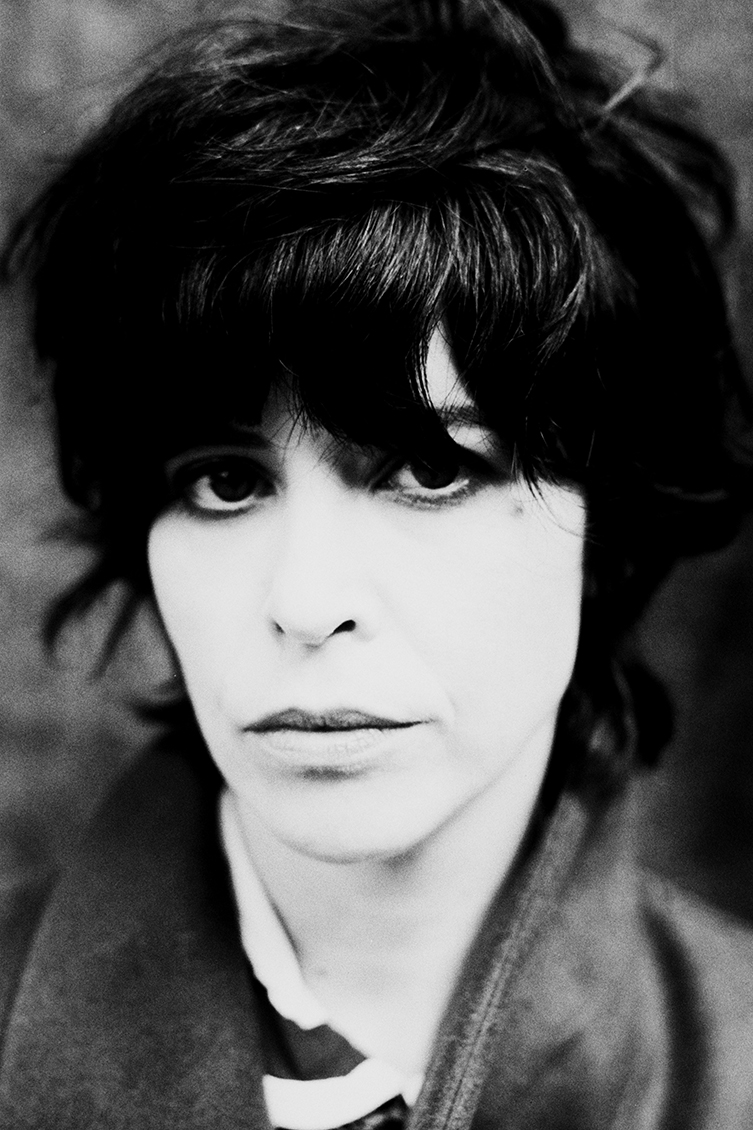
HM: And I think elements of this will actually, I would like, and some bands and artists, to keep that: do two sittings, have one with the grandparents come (laughs), or the people with kids, or people who don’t like going to a Rock concert but who do actually like music. So, there could be some nice things that come out of it, but yeah, I’m just trying not to think too much about the loss of opportunity. It all about the recovery!
GG: Yes!
HM: How you deal with the changing terrain, nothing’s ever certain: you’ve just gotta keep on making plans and trying to fulfil them. And if they have to change, it’s okay, you just kinda don’t think about it too much, just grow. I’ve been lucky, I’ve been able to do a few acoustic shows. I’m gonna do a show for my upcoming single, but yeah, it isn’t great, but it’s a pandemic, ya know! (laughs)
GG: Hahaha! Yes, indeed. But even getting to perform at all right now’s pretty good because the live infrastructure in the UK’s totally gone. But for you, I’ve been keeping an eye on things, and so it’s been acoustic performances for you. Now, forgive me if I’m wrong but this is a whole new style for you: when you’re fronting the Jezabels, you’ve got the rest of the band. You’re the focal point to a large degree, but you’ve got the others up there bouncing around with their energy. This time, it’s you, an acoustic guitar and not much else at all! How are you finding that change?
HM: Well, I mean, that was not the plan (laughs). Yeah, like, I’ve got to admit that when I did those shows supporting the DMA’s, I was beating myself up because I’m not particularly good at playing the guitar, it’s quite new to me, but also like, getting up there and performing on my own, with new songs, I haven’t been playing them for years, you know? There’s been a lot of adjusting to the newness, and a lot of, ‘Wow, I didn’t realise this was gonna be this hard, (laughs) this challenging’ because after ten, or twelve years maybe, of playing with the band, playing hundreds of shows together a year, maybe thousands of shows, yeah, it was hard! I was really out of my comfort zone, and there’s not that wall of sound to demand your attention. You’re exposed and your small (laughs) and you’re on your own.
"What's important is getting out there and singing the songs at whatever level I can. Whatever I can do to get in front of people, I'll do it!"
I’ve seen solo artists being commanding, but that’s not ever what I was going for, really. I am going for a rock sound with a band, but with Covid, it’s all to do with costs and keeping the people amounts down. Like, I have to pay a band and there isn’t that amount of money with that amount of tickets you can sell, or the fee you can get if you’re supporting, so it’s like: I can’t do this with a band. I will do some band shows when it’s viable, but navigating that starting-out thing, all the...the...it’s boring, man! I wouldn’t normally have spoken about this end of things but because of the pandemic, there’s practical cost things that change everything. But I’m actually quite grateful for it, because I did always want to be a bit more self-sufficient and, like, get in my car and take my guitar (laughs)! Do you know what I mean?
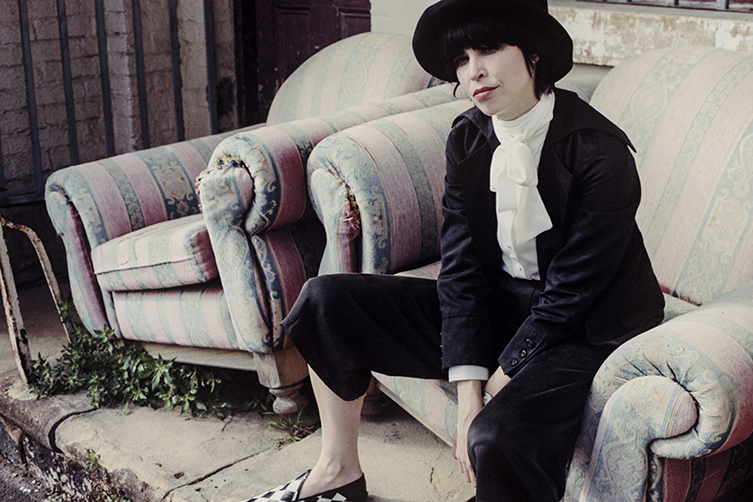
GG: Haha, yeah, totally! It’s the dream!
HM: This kind of folk-hero, sort of dream that I’ve now developed! Like, ‘Imagine if I go out and I don’t need anyone but me and my guitar! That’ll be coool, you know?’ (laughs) Meanwhile, I can only play three chords. But: that’s all you need!
GG: Three chords and the truth!
HM: So they say! But (laughs) it does get a little bit tiring for the audience! ‘Oh, she’s playing D again!’
GG: Hahaha!
HM: Oh, and to the ‘A’ again!
GG: It’s like, ‘I like the D chord, I don’t want to change!’ (laughs)
HM: It’s a good chord! I’m not quite over it yet. But yeah, I really enjoyed it because I got up there and did 6 shows on my own. At first, I was beating myself up, like, ‘This sucks, I suck’, but you get better by doing it. Now I’m like, you can’t take away from me the fact that I’ve done that. I can do it!
"The UK is way better outside of London"
GG: Good attitude. So, yeah, building on what we were just talking about, the whole grab the guitar, jump in a car thing, have you ever looked into the possibilities of triggering stuff form a laptop running Ableton or Mainstage or something?
HM: Oh, yeah yeah! Totally! I’m not a purist or anything at all. Actually, I’m just a luddite.
GG: Hahaha!
HM: I’m fully into playing with tracks and stuff like that. Some things probably just don’t sound as good on tracks and you’d want to have, like, a basic rock band. For a rock sound you want a rock band, but you can put something on track to bolster it up: you don’t have to pay a keyboardist! I’m not a purist in that way. I mean, ideally, I would like eventually to have seven people on stage that are amazing musicians, but it’s a post-Covid world. What’s more important is getting out there and singing the songs at whatever level I can.
Yeah, I would do (tracks) but I’m fucking terrible with computers (laughs). I’ve gotta get Johnny to basically help me with almost everything! And he’s like, ‘Awww, I’ve got my own shit to do!’, so...yeah, I might look at that as an option. A reworking of the songs in a track-y way at some point but yeah, one step at a time!
GG: Yeah, fair enough.
HM: I’m looking forward to doing full band shows, though. That should be fun.
GG: That’s what you’re working towards. The moment we’re in is not how things are going to be forever, so it’s good that there’s that plan on the horizon.
HM: You know, what I’d like though, as well: I think that what this has brought about it that people used to be a bit more spoiled and used to have these bullshit fuckin’ standards or expectations or notions that kinda go out the window now. Like, the idea of putting tracks in a rock band, some people would be like, ‘Uhhhh, noooo!’, some people wouldn’t be into it, but now, it’s like, ‘I don’t give a fuck.’
GG: Uh-huh.
HM: And I don’t think anyone would really care. Like, as long as you sing for them, it would take someone pretty fuckin’ audacious to criticize an artist now, for getting up and putting some tracks in a rock sound. It’s like, ‘Dude! (laughs) These are really hard times, you know!’ I think there’s a whole new world, and it’s exciting for me because I’ve left a lot of the fears I had: notions of authenticity or whatever. I’m like, you know what? Whatever I can do to get in front of people, I’ll do it. It’s kinda liberating!
"It's not an easy thing, touring and missing all your friends' weddings. There are sacrifices and you have to love it, because it's not easy."
GG: Yeah, it’s awesome! As much as it’s probably scary as well. You mentioned a while ago that you haven’t really been playing the guitar for that long: I don’t know what your songwriting process was previously with the Jezabels, but did you learn the guitar in order to be able to do this?
HM: Kind of. So, I’ve always had ‘D’ (laughs), I’ve always known D. I always played a few chords and I’ve written songs on the guitar for a long time, but I never needed to be able to play it: you know, here’s a barre chord, here’s how the song goes, roughly speaking. But now it’s more like I’m coming up with all of the ideas. With the Jezabels, we would co-write, so maybe someone else would come up with a chord progression or a rhythm or whatever, you know, so there’s a lot more brains contributing. Now, I need to play because I need to come up with everything. What actually got me to learn the guitar was when Heather, our keyboardist, was diagnosed with cancer a few years back.
GG: Yeah, I remember.
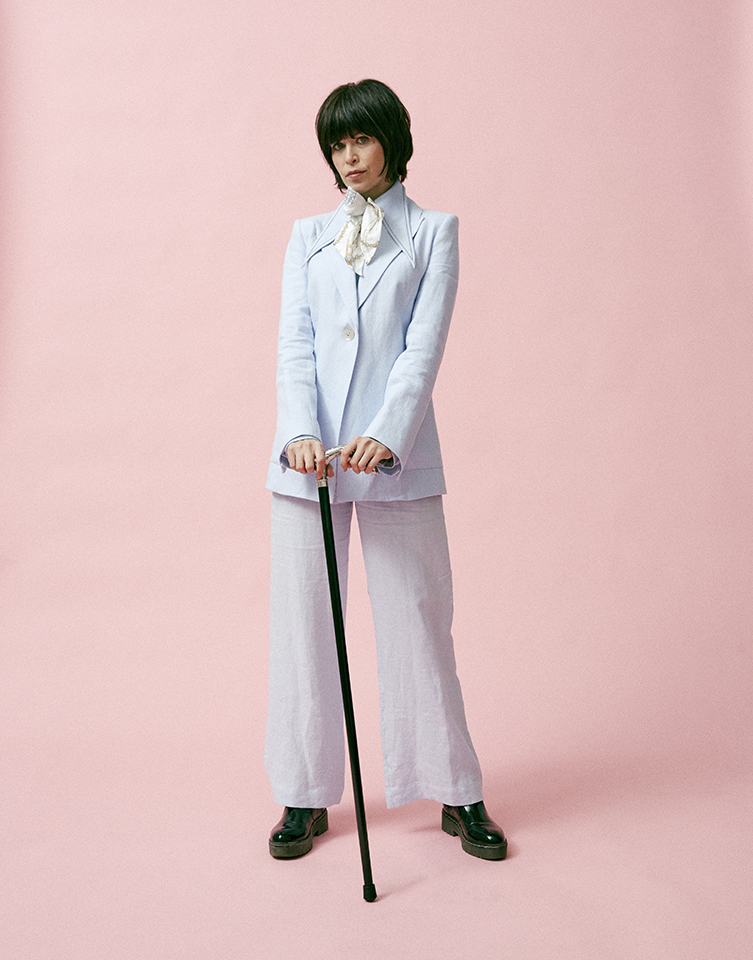
HM: We had to cancel our world tour of our third record, Synthia. It was a shame because it came out, and we really loved the album and we were gonna go on this tour. She’d been diagnosed earlier but she hadn’t had to cancel anything, she managed it. But it came up and she had to do chemo. We couldn’t do the tour, and there was a massive loss of like...income and stability and like, purpose in our lives. I was like, ‘I really wanna just at least give this record a bit of a run with radio, or just promote it a little bit, so they sent me to America to play these songs acoustically to a bunch of radio stations. I was like, ‘...I don’t...play...guitar. So, I guess I’ll learn it!’ (laughs) So I learned these songs within a month.
GG: Wow!
HM: Really baaadly! And I drove around America on my own, playing to radio stations to kind of, you know, remind them that we were a real band and that one day we might be back.
GG: So that kind of pre-empted the subsequent solo stuff then.
HM: Yeah, it was a necessity thing. And it was mostly nerve-wracking and horrible because most of the time it was filmed, and I was terrible at the guitar! But I enjoyed what it enabled me to then do. And also hanging out with the DMA’s guys. I met them at a similar time and they’re really quite generous with sharing and demos and jamming and, like, invite people over after the pub next door, where we used to live. Everyone would just be kind of putting guitars on each other, so they encouraged me to pick up the guitar a bit more and show them songs. Then you start hearing people reacting to certain songs and they like it or they don’t like it. You go, ‘Okay, that’s a good one, I’ll keep it!’
"Fender Strats are a pretty good all-rounder"
So, it’s kind of like, I started hanging out with more musicians outside of the Jezabels and forging a bit of an idea of myself as a songwriter. The guitar was just completely instrumental – excuse the pun – because you just need something else, like, you need a tool, whether it’s some other person or an instrument. You just need one other thing to bounce off of. So, I think the reason the guitar is so romanticised is because it’s just that basic kind of partner in crime.
GG: What a great way to put it.
HM: I’ve discovered it and find it inspiring.
GG: So, when you’re in a songwriting situation, are you one of those people who just sits down and plays a chord, or is there a melody first? Do you have a lyrical idea to work from? How does the process begin for you?
HM: That’s a bit of both-type thing. I’ll often come up with melodies, again probably from the Jezabels days when I didn’t really play an instrument. I’d come up with a melody and record it on my phone or whatever, work out the chords. But now, I’ll sometimes just pick up a guitar and strum and it will lead to a song, so that’s good. But generally, melodies first and then words come.
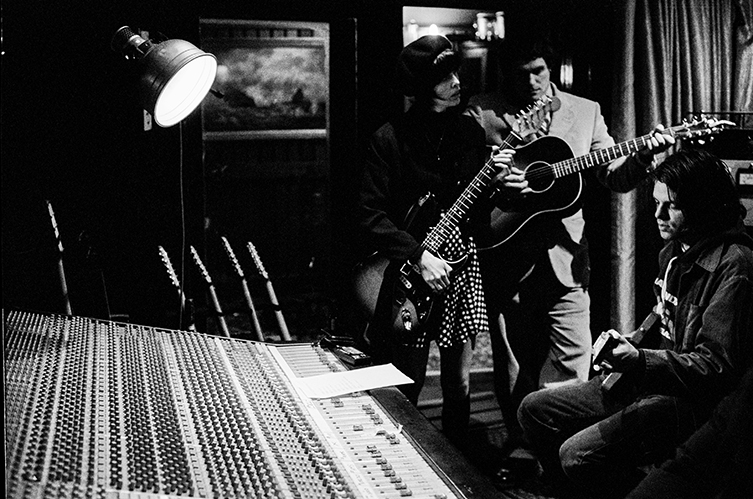
GG: Uh-huh.
HM: Like, I do...a lot of people do this, I think, but I sing in kind of gibberish and try and make it sound cool, and then kind of attach words to the sounds.
GG: Cool, yes, I think lots of people do that! So, in terms of guitars then, what particular guitars do you prefer?
HM: So, I have a Lag acoustic that my Dad gave me. I’m sort of surrounded by other people who know about guitars, which is lucky. Okay, so the first guitar I got was when I was in LA and my Dad just told me, ‘Go into one of those great music shops in America and buy yourself a vintage Gibson’. And I just went in – I hate music shops, because of my childhood of always being dragged around them and going, ‘I wanna go, dad!’ and he’d be jamming with the dude in the shop (laughs) – so, I went into a music shop in LA and pointed at one that I liked! ‘Do you wanna play it?’ I was like, ‘No, that’s fine!’ and they were like, ‘Cool, that’s a really good choice!’ (laughs) Great! Got a Gibson! And then I played on that for a year and then it got stolen.
"I think the reason the guitar is so romanticised is because it's just that basic kind of partner in crime"
GG: Aww, shit!
HM: Yeah! And Dad gave me an old Melody Maker electric, which I call Blackstar, because it’s painted black and a previous owner has etched stars into it. He gave it to me just after David Bowie died, so I obviously called it Blackstar.
GG: Ah, David...
HM: But it doesn’t sound the greatest. It’s like an old...I think my Dad’s the kinda guy who preserves guitars in their original state, and it doesn’t really make them sound that good, necessarily!
GG: Yeah, I know what you mean!
HM: I need to fix it up a bit. But yeah, then he gave me an acoustic Lag which I love. And I’ve been playing Johnny’s big Gibson jumbos recently. I play just what’s around, but Fender electrics: I’ve discovered that Strats are the best for me, live. I’m trying to get a bit away from always playing live, because I wanna focus on being a frontperson again. But yeah, I find that they have a warm rhythm sound. And you can add a distortion, and they’re consistent. On a record, you can put on heaps on different guitars, whatever’s in the studio, and fuck with the sound, and the producer can do all of this weird shit and you’re like, ‘how am I gonna repeat that?’ So, I guess Fender Strats are a pretty good all-rounder.
GG: Yes, I always want to be more exciting with my guitar choices, since Strats are so ubiquitous, but they really are just amazingly useful.
HM: Well yeah, I mean, look: I reckon that’s why it’s great that there’s a studio, and you can put that weird guitar on one song, and that’s great (laughs). But you’re not gonna take it on tour and swap out 8 guitars and shit, you know? You gotta be realistic.
GG: Yeah, totally.
HM: On my records, I don’t play lead or anything, so a lot of the sounds you might hear on my EP would be Johnny’s or Paddy Harrowsmith from Green Buzzard, who you should look up if you like guitar! They’re on IOU, my label, and they’re a great guitar band. So I made them play on my EP (laughs) You know, when you can’t do something that well, you get other people who are better!
GG: Totally! But I tell you what: one thing that you obviously do do very well is your vocals. That was one of the greatest things about the sound of the Jezabels, because there was already a big, epic sound but you have this supersonic voice.
HM: Thank you.
GG: Not at all, it’s a beautiful instrument. Obviously, that’s a gift that you’ve been born with, but how do you look after your voice when you’re on the road? How do you warm it up?
HM: Well, it’s a little bit of a gift, or a talent, but I’m also, like, I write lots of songs that are not particularly easy for me to sing. I find fun in working out how to do it and pushing myself. It came from playing with Nik (Kaloper, drummer for the Jezabels) who is a metal drummer. That was his background and he just couldn’t play soft! (laughs) He couldn’t! When I first met him, I was quite a different singer. All I’d played was acoustic on my own, lots of weird emo kinda teenage shit, and I just had to start learning how to project. And that’s also why I started singing high, because it suited these kinds of metal-ey...I was going for a sort of Kate Bush-ey, dramatic, gothic thing. Me singing low over that wasn’t dramatic enough to do justice to the music that they were playing.
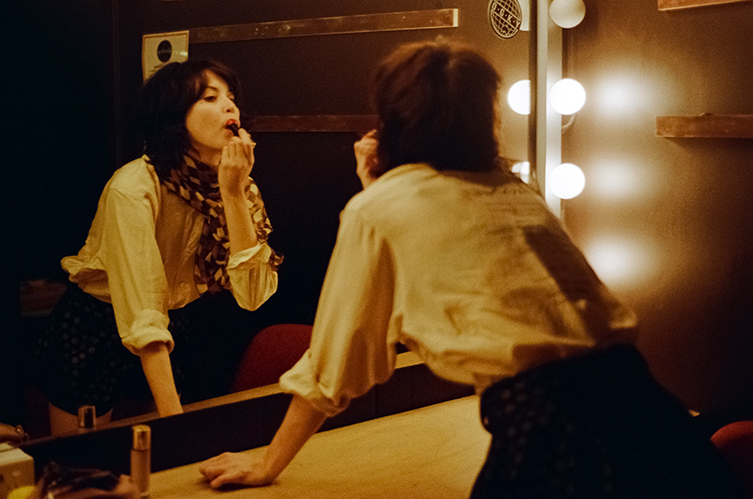
So a lot of my singing methods, if they are methods, came from this. I found, from doing my solo stuff, that actually a lot of those songs are not the best register for me! I’d get like, I was pulled into the extremities by that band, which is cool, which is why it’s kinda different: I go low, I go high and I play these roles and it’s quite dramatic, whereas when I sing a song of my own now, I’m actually finding that there’s somewhere in the middle that’s my sweet spot. That’s really fun because it gives a point of difference, and I’m also learning to use my voice in that area which is quite a challenge, I’m actually not immediately that good, and I’m still kind of working it out, like I did with the Jezabels in the early years. I find it fun, writing a melody that I can’t quite sing and working out how to sing it, and practising it. Some people just sing with ease but with me it’s a bit of a mix of talent and work.
GG: Okay.
HM: But I do do warmups, and the reason is, on tour with the band, years back, I was losing my voice a lot. I went to a singing coach in London, because we were living there, and I lost my voice, She didn’t teach me how to sing, she was kind of a rock person, and a lot of rock people don’t actually want to know how to sing properly, they just want to not lose their voice! She just gave me some exercises but the basic premise was, like, what a lot of singers do – and this has always stuck with me – they think that they need to protect the voice. But, it’s just like any other kind of muscle system: you should strengthen it. I mean, obviously if you over-use something, you injure it – that’s what losing your voice is – but if you strengthen it, you build up its ability, and eventually you don’t really overuse it because it can be pushed.
"We were supporting Depeche Mode in these stadiums and I lost my voice! I just wanted to crawl up and die!"
GG: Interesting!
HM: Yeah, so I was trying to not go out, trying not to drink, really stressing about preserving this fragile little creature that was my voice, and then she told me to be brave with it: use it more. Strengthen it more. Don’t worry about the cold that you might get; don’t worry about if you want to have a cigarette. If you want one, theoretically, you should be able to do that and not lose your voice. You should be able to talk to people after the show if you do these warmups and warm downs, and strengthen your system, basically.
GG: That must have been great to hear.
HM: That really liberated me. I thought, ‘Is this just gonna be my life?’, like, ‘Now I have to go!’ and it’s like a finite resource. She kind of taught me how to grow the resource.
GG: That’s really amazing!
HM: Obviously, there’s opera singers and there’s actors and people that do fuckin’ musicals every night, so of course it’s not quite right that you just lose your voice once a week. You’ve just got to look into it and find some exercises. It’s probably different for everyone, but yeah, it’s taking responsibility for pre-empting it.
GG: That is really good advice. The show must go on!
HM: Actually, the reason I had to do that was, we were supporting Depeche Mode in the UK and they were playing these fucking stadiums or whatever they are, arenas, I don’t know. Really big, the biggest rooms I’ve ever played in! And I lost my voice! And because we were the support act, we were getting paid, and we wouldn’t get paid if we didn’t do it, and then it’s all the costs of getting over there: I had to do it. So, I had to do the show, with no voice, in front of tens of thousands of people. It was so horrible, I just wanted to crawl up and die. I was like, ‘I will never allow that to happen to myself ever again’.
GG: Goodness me. How did you get through it?
HM: I just tried to sing around... I’d lost my voice: my voice disappeared mid-note. Anyone who saw the Jezabels in Manchester supporting Depeche Mode are probably not a fan! (laughs) It was pretty bad. I had to take steroids, all that stuff, the rock-doctors that give you a steroid and help you have this false strength for a while, but it didn’t fix it. I just ran out. It was terrible.
GG: Wow. That’s any singer’s worst nightmare, and you had it in front of Depeche mode’s audience.
HM: Yeah, I’ve been there! I’ve done it.
GG: That’s why you can be so fearless with your solo career, because the worst thing that could ever happen to a singer has happened to you, and you survived it, you know what I mean?
HM: That’s the thing! See, terror is worse than horror: when you fear the thing, and it’s always around the corner. When you actually see it, and it happens, it’s never as bad as you thought.
GG: Very true.
HM: Anticipation.
GG: Yeah, you can apply that to so many things as well. So, what’s coming up next for you? You mentioned earlier about being in Melbourne for mixing, and your manager told me about a possible single release? That won’t be from your existing EP, will it?
HM: No, I’m not gonna make every song a single! (laughs) To be honest with you, they wouldn’t all have been singles, but that Brat one was meant to be coming out around the time I was in the UK. It kinda of looked weird because I wasn’t in the UK and it was like, ‘I’m going to put the fourth of five songs out! (laughs) For no particular reason. As a single.’ No, it’s a new song that I wrote the day my EP tour got cancelled because of Covid. I was about to fly to Sydney, had my bag packed and everything, and I just called my manager and said, ‘This shit’s gone to hell. What if I fly to Sydney and get trapped, or they close the borders? The show won’t go on because I’ll be stuck in Sydney. He called me up and was like, ‘Yeah, the venue’s closing, cancel the flights’ and then it was like dominoes from there. Everything else just went downhill.
I wrote this song with that feeling in mind. It’s called The Chain. It’s a little bit like...I just started strumming, again, ‘D’: great chord. (laughs) And it was just a bit of a feeling of lost dreams, I suppose, but it was also this kind of feeling of, like, I’m being a bit kinda connected with everyone by this strange invisible chain. So, it’s a bit of a happy/sad song, in a way because I felt very...I don’t know if you ever get depressed sometimes, but I find it’s a little bit like: you have this feeling that anything good that happens is gonna be followed by something bad. If you get far in life, it’s because of someone else somehow suffering, like you don’t deserve to get somewhere, it’s kind of like this oppressive metaphorical chain of ‘can’t be good’. And I think that, when Covid hit, a lot of depressed people were like, ‘I knew it! (laughs) Now everyone knows how it really is and how I feel! It’s true! There is a kind of looming ominous sort of destruction that is always inevitable!’ But I’m not always depressed, I just get it occasionally, like everyone. I just really felt it. It’s like that movie Melancholia, where she’s depressed and she’s fine with the end of the world!
GG: Yeah, yeah.
HM: Yeah, (laughs) so it’s like, I’ve kind of been feeling like this the whole time! So that is kind of the sentiment behind this song, and it’s actually one of my favourite songs I’ve ever written actually. Again, it was a bit of a silver lining to Covid: it was kind of bestowed upon me by the Muses because I was sad. So, I’m really excited about it!
GG: I think I’ve heard that! Have you played that acoustically already?
HM: I did! Yeah, I played it acoustically on my Isol-Aid festival set and I posted it, yeah.
GG: Yes, I have heard it! It’s a lovely song. I’m really looking forward to the new album!
HM: It’s very different on the record! It’s an upbeat, borderline disco-rock song.
GG: Nice!
HM: Indie-disco! Not actual disco.
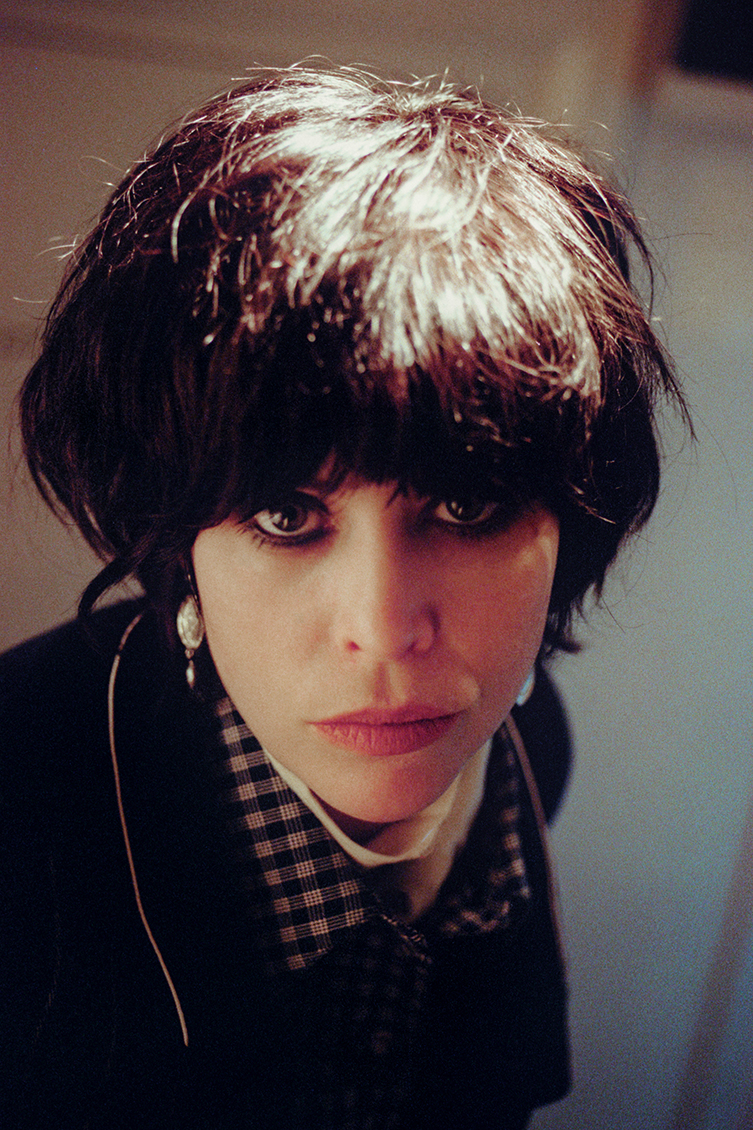
GG: Cool, I think I know what you mean by that, haha! So yes, now, obviously being that I’m Scottish and based in Glasgow, I want to know all about your decision to go and stay in Edinburgh for a while! What was going on there?
HM: Well, my Dad’s from Glasgow, and I’ve always kind of liked Scotland. I’ve always thought that I’d live there at some point. It’s kind of like when I try and explain when I meet people in Glasgow, there’s a certain ilk of people that are exactly like my Dad. I always thought he just was crazy, then I realised he’s just Glaswegian! (laughs) And he makes sense there: my whole family makes sense and I kinda make a bit of sense. It’s a strange thing, being Australian of European, or British descent, whatever you wanna call it, where you’re sort of...unless you’re a few generations in, you’re kind of a bit of a fish out of water in your own country.
GG: Uh-Hmm.
HM: Like, you’re not from here: your skin’s not made for the sun, your heritage’s not there. I think that’s why a lot of Australians travel so much. It’s like, they have a thirst for the home country. So, I was always going to go there and live there. I lived in London a fair bit but I somewhat hate it, and realised that the UK is way better outside of London: it’s like two separate countries. Johnny, my boyfriend, had coincidentally always said about Edinburgh – before we met – that ‘I could live in this city’, we’d both said that independently of knowing each other. So, we were just kinda partying a lot in Sydney and it was getting a bit cyclical, a bit toxic, a bit incestuous, and I just kinda woke up one day and went, ‘Can we, like, move to fuckin’ Scotland?’ (laughs) He was like ‘Yeah, let’s do it!’ And because we’re from Australia, and I grew up in Byron Bay, which is a beach town, the castle and the cobblestones and the gothic-ness - the oldness of Edinburgh - really appealed to us. It’s a fairy-tale city to someone who didn’t grow up in Europe. Glasgow’s cooler, and if we did come back to Scotland, we would definitely do Glasgow, but we just wanted that little fairy-tale.
GG: Oh yeah, Edinburgh’s like that to me, too! I’m originally from a small coastal town too, and Edinburgh is like a fairy-tale to Scottish people too. It’s the ‘biscuit tin’ version of the country.
HM: Ok, so you get it!
GG: Very much!
HM: I love the Scottish people and I love the culture. I love the wit! The dark wit! (laughs) They are quite switched-on people, you know, and yeah, it’s just my heritage, so it makes sense.
GG: Yeah, I didn’t realise your Dad was a Scot! Amazing.
HM: Yeah, and we made a lot of friends in Glasgow. Funnily enough, we made more friends in Glasgow than in Edinburgh. So, we’ve got mates over there, and Johnny’s actually a Godfather to a Glaswegian child that was just born!
GG: Oh wow, that’s great!
HM: Yeah, so we’ll be back over.
GG: Well, I wouldn’t mind swapping for a while: I think Australia sounds amazing! Are you up for that?
HM: I wouldn’t mind swapping: I just don’t think they’ll let you in! (laughs) Sorry!
GG: Yeah, that’s true. Sad.
HM: They’re quite strict!
.jpg)
GG: Fair enough, quite frankly. Now, my last question, Hayley. Since meeting you guys before a few times, I’ve kept in touch with Sam (Jezabels’ guitarist), and last we spoke, he was talking about him and Nik going to Uni to be teachers! You guys are massive in Australia! What’s actually going down? Are Jezabels on, like, a long hiatus?
HM: Well, he’s back at Uni and also working, and Nik did go back to get his teaching degree. He already had a Science degree. Heather is also back at Uni. What happened was, we kept trying to adapt the band to Heather being unwell and needing to often be back for treatment. There was a lot of kind of moving and cancelling of gigs, and it was really stressful for her to commit to records, the record cycle. Once you just kind of get in the industry, it gets a bit demanding.
GG: Uh-huh.
HM: And it’s not like you can just sustain or you can just make things when you want. There comes a cycle that you have to feed, and she just couldn’t really mentally and physically cope with the touring cycle. I think, after all that, none of us really could in that format. So, it just naturally kind of petered out but we never broke up, and we actually have a gig at our old uni in a few days, and we sometimes, you know, talk about writing. We did a Covid gig, and every now and then we do stuff, but it’s just: everyone’s doing their own thing. I, obviously, am doing this solo stuff, and I need to establish that it’s not just a side-project, but what I’m doing.
GG: Yeah!
"Nothing's ever certain: you've just gotta keep on making plans and trying to fulfil them."
HM: So, it’s in my interest to at least make sure that people know I’m committed to my solo stuff and not just ‘Hayley from the Jezabels’. So, in that sense, it’s a good time for me to do that, and it’s a good time for them to, y’know, feed their other desires. Honestly, the rest of them never really wanted the whole thing: they enjoyed it; they liked it, but it was never their ambition to be rock stars, you know. I think Nik wanted to play at the Hopeton when he was a kid, which was like the first show we ever played, and we sold it out. It’s a hundred people or something. And that was his dream, and he did that, the first time he ever played, so everything else was just like, wow, okay! Bonus! There wasn’t like...you have to really want it, because it’s not an easy thing, touring internationally and missing all your friends’ weddings. There are sacrifices and you have to love it, because it’s not easy. If it’s not your calling, then it’s like, ‘What am I doing here with new people again?’ (laughs) You know?
GG: Yeah, totally!
HM: So, it’s not like we’ll never write together or even play together. We’re just not at the moment.
GG: Cool, good to know! You mentioned that you guys are actually performing together in a couple of days?
HM: It’s just a really short gig at a graduation, at the university that we all went to. They asked us to play.
GG: Nice!
HM: Couple of songs. But yeah, every now and then we do stuff! (laughs)
With that, Hayley returned to her evening in Sydney, and I to my morning in Glasgow.
Hayley makes lots of great observations about just what it means to be an artist right now in 2020, about the realities of what it takes to carve one's own way in this strange world we find ourselves in. One thing’s for sure: the world needs more rock stars, and Hayley’s in for the long game. Hopefully we’ll be seeing her back over this way sooner rather than later, but in the meantime, head on over to the official Hayley Mary website to keep tabs on her new releases, and her live shows for those who are over in Australia! Her newest single, The Chain, is released everywhere on Nov 5th.
We’d like to thank Hayley for giving us such an entertaining and enlightening conversation, and to Dave Berry for putting us in touch.
As ever, thank you for reading! We’ll see you next time.

